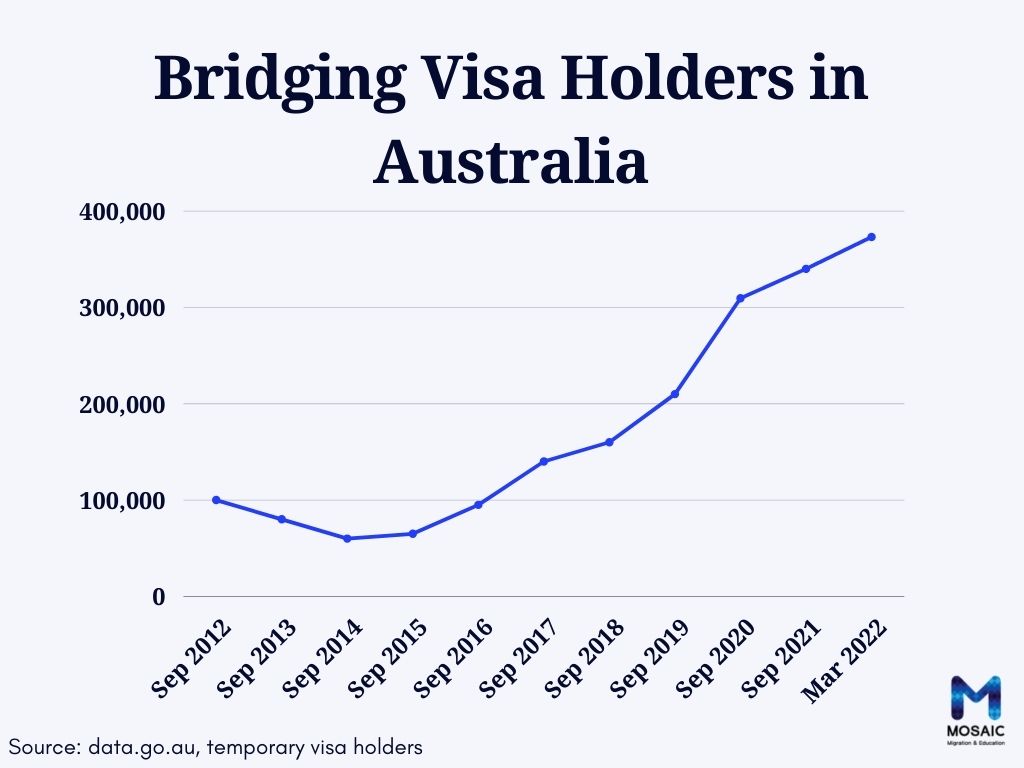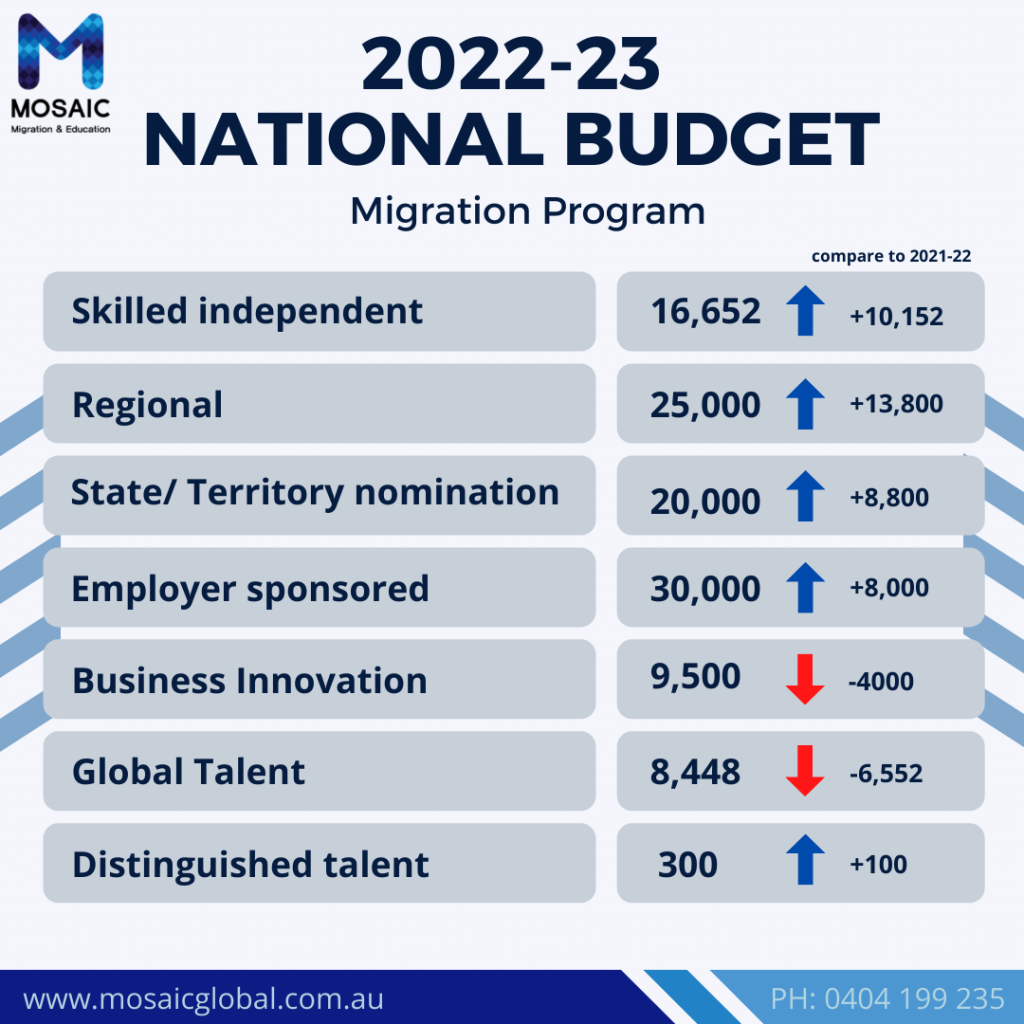
How will the Federal Election affect the Visa system?
While the 2022 Federal election is coming ahead, people wonder how the election will impact the immigration policy.
Immigration is an ever-present issue in the political debate, especially nowadays, because there has been no mention of the current visa system during the election campaigns.
The current visa system is described to be out of control because of the ‘gridlock’ situation. Gridlock is when the visa applicants wait for their decision and are placed on a bridging visa to maintain their lawful status. However, as the gridlock keeps extending, the number of bridging visa holders increased to over 200,000 in 2019 and 373,109 as of March 2022.

It captures people’s interest even more because the 2022 Budget shows a dramatic reduction in the Department of Home Affairs’ resources. These include the Migration management falling from $397 million in 2021-22 to $360 million in 2022-23 and $291 million in 2023,24. Not only but the funding for the immigration functions of the Department of home affairs from $2.6 billion in 2021-22 to $1.7 billion in 2023-24, showing a decline of $0.9 billion over two years.
Despite the dramatic reduction digits on the funding for the immigration functions, the number of people in Australia waiting for their visa application results is increasing more and more.
With the travel restrictions easing, more people are expected to be coming to Australia. However, with the exiting massive gridlock in the visa system and deducted funding, the Department of Home affairs will likely reduce its ability to deliver its immigration functions.
Many people are looking forward to how the outcome of the upcoming Federal Election affects the immigration policy.
The 2022 Australian Federal Election will be held on 21 May 2022.

TSS Subclass 482 Visa Update
The Australian Government has updated additional information about the valid period of the new pathways for subclass 482 short-term holders who are eligible to apply for permanent residency on April 21, 2022.
On March 18, 2022, the Australian Government announced that from July 1, 2022, subclass 482 short-term holders may be eligible to apply for the Permanent Visa.
To be eligible to apply as a short-term stream TSS 482 visa holder, applicants must have been in Australia during the COVID period (February 1, 2022, and December 14, 2021) for at least one year.
This article will outline the changes to the 482 Short Term occupations and the valid period of the new pathways.
The changes to the 482 Short Term occupations are:
- (Legacy 457 Worker) Age Limit exemption
If you have held a 457-visa on or after April 18, 2017, the age limit is waived when applying for a 186 TRT visa.
The age exemption will be accessible for 2 years from July 1, 2022
- Apply Third TSS Visa in the Short-Term Stream in Australia
If a 482 short term visa holder needs to extend a 482 short term visa, a third 482 visa can also be applied in Australia if the new application is made before July 1, 2023.
The third TSS visa will be accessible for 1 year from July 1, 2022
- Permanent Residence through 186 TRT Stream
Existing TSS subclass 472 visa holders in the short-term stream will be able to apply for a Permanent Residence through the 186 TRT stream.
This pathway will be available for 2 years from July 1, 2022
Contact us if you want to find out more about the eligibility requirements or want more information.

Immigration trends in the 2023 Federal Budget
Greetings.
We are pleased to announce that our news catalogue will be resuming with the latest Australian Immigration news, updates, and information. Due to the relocation and realignment of our organisational changes, we were not able to provide any immigration news for the past few months. However, as part of this update, we will provide the latest immigration news on our website and our social media channels.
In this article, we will look at the major change seen in the Migration Program, and the Immigration Trends of the 2022-23 Federal Budget recently announced in early April.

As shown, the biggest change seen in the Migration Program is the major decrease in the places for Business Investor visa, Global Talent visa, and Partner visas and a significant increase in the places of Skilled Immigration and Employer visas.
The Business Investor visa and Global Talent visa are experiencing significant reductions in the new places announced, and it is surprising news for the prospective applicants for these visas. In particular, the numbers look more dramatic compared to 2021 and the year before, when the places increased three times for the Global talent visa and doubled in 2021 compared to 2020 for Business Innovation visa. Also, compared to past places during the covid pandemic, there is a big decrease for Partner Visa as well.
It can be assumed that,
▶ There was a need to secure more places in the Skilled Migration visas for the 482 short-term list occupation. As briefly mentioned in the previous post, 482 short-term list occupations were impossible to apply for a Permanent Residence but as of the new regulations, they are now eligible to apply through the 186TRT stream.
▶ The significant increase in Regional visas can be seen as a positive reflection of the strategies for regional growth and development that the Australian Government has pursued for several years.
▶ The significant increase in the State/Territory Government-sponsored visas also allowed the Federal Government to grant powers to each State/Territory Government, allowing them to select the required occupations, skill levels, and age that can contribute to the growth of the government.
The Migration Program plays a significant part in the Australian Federal Budget announcement. It plays a big role because it balances the development in each State/Territory Government.
A key aspect of the Federal Budget for 2023 is it has expanded the opportunity to apply for a permanent residency to non-permanent residents who have contributed to the Australian economy and stayed in Australia during the Covid-19 period. The Government has increased the places of the Skilled Independent visa, Regional visa, and State/Territory Government-sponsored visas to revive local and regional economies that have been affected during the COVID-19 pandemic.
Therefore, to maintain the ceiling of 160,000 places, the Government had to reduce the numbers of Business Investment visas, Global talent visas, and partner visas, which have benefited from increased places over the past two years. In the case of partner visas, which increased numbers during the Covid-19 period to help reunite family members, the reduction in numbers does not seem to have a significant effect as much as foreigners are able to enter Australia.
Based on the past processing times and requirements for when the Business Investment visa places were more significant, it is now reasonable to expect a higher EOI score requirement to receive a sponsorship from the State/Territory Government and a more extended processing period.
Especially, with the revised criteria in 12 years since 1 July 2021, the qualification requirements to grant a State/Territory sponsorship is expected to greatly affect prospective visa applicants with the processing period and EOI score needs.
Over the past 13 years of processing many clients’ permanent residency visas, there were hardly any times I recount a positive change in immigration laws for those who want to immigrate to Australia. As I emphasise in every consultation, if you are eligible to apply, we recommend that you do so as soon as possible without any delay. If you are thinking of immigrating for a business investment visa, I recommend applying as soon as possible before the financial year 2022 is over.
The criteria for calculating the Business Investment visa score and qualification requirements that will be applied from July 2021 will be explained in detail in the following article.

What is the Business Innovation and Investment visa (subclass 188)?
The Business Innovation and Investment visa (subclass 188) is a points-based immigration programme that requires nomination from a state or territory government.
This visa is for people with successful business or investment experience who want to own and manage a new or existing business in Australia, or to invest in an Australian state or territory. The visa is a pathway to the Business Innovation and Investment permanent residency visa (subclass 888).
On 1 July 2012, the basic requirements of the business/investment visa (subclass 160 -165) have been changed by double which have been in effect for more than eight years. The number of inquiries decreased for a while due to the sudden change of the requirements in 2012, but the visa has grown in popularity again from 2014 as the age limit is under 55 or even no limit, and the various benefits are provided on provisional visa.
There are six types of subclass 188 visa currently in effect. It is also called 188 A, B, C, D & E depending on how institutions or people call it.
188 A – Business Innovation Stream
188 B – Investor Stream
188 C – Significant Investor Stream
188 D – Premium Investor Stream
188 E – Entrepreneur Stream
188 – Business Innovation Extension & Investor Extension Stream
The most common ones out of the above six types are 188 A – Business Innovation Stream and 188 B – Investor Stream. We will talk about the reason one by one in the upcoming columns.
To apply for the subclass 188 A and 188 B visa, applicants must have at least 65 points (each state may require additional requirements or higher scores) based on the age, academic background, business/investment experience, sales and assets specified by the Australian Immigration Department.
Subclass 188 visa is not a permanent visa, but it is called a provisional visa.
The reason is that if approved, a valid visa for four years and three months is provided (up to eight years if applying for an extension), and also the freedom to study, work, and do business/investment in Australia, and free school fees for children – the benefit of permanent visa holder.
In 2019, for the improvement of the visa programme which has been in effect for the past eight years, the Department of Home Affairs has asked some immigration agents or lawyers for the new proposals and measures. We are not sure when the new programme will be introduced, but due to the Coronavirus Pandemic, the visa would be continued to take effect for the time being without any major changes.
However, in my point of view, if the basic requirements are changed, it will be more difficult to apply for the visa with the condition for the current requirements, as what happened in 2012. People who are planning or preparing to emigrate through the Business Innovation and Investment Visa are advised to apply as soon as possible before the immigration law is changed again.
In the next column, we will take a closer look at the Eligibility Criteria for the Subclass 188 A – Business Innovation Stream.

Case-study – 188A Business Innovation Stream Visa
In this column, we will talk about 188A visa requirements with real-life cases on the visa.
The most frequently asked questions about the 188A visa are the proof of assets, business experience and dependent children.
Proof of Assets
First, let’s take a look at two real-life cases based on the content from the most received inquiries about the proof of assets.
- A corporate business owner A transferred 20% of the company’s share to researcher B as a scouting offer for a crucial technical advice during the business expansion. In this case, from the time the share is transferred, 20% of the company’s net assets are also considered to be transferred. In other words, calculation of the applicant (A)’s business assets would be (net assets of the entire business x shareholding ratio of the applicant and spouse).
- For C, who inherited a large building with three siblings as an estate, only the equal percentage (25%) of ownership is recognised based on the certified copy of the register, unless there is a specific definition of the distribution, C can’t claim the whole building for the proof of assets even though there is an oral agreement of permission of use. Furthermore, the applicant must meet the condition of transparency of the inheritance process.
Among the questions about assets, there are a lot of questions about whether a virtual currency such as bitcoin is included in the asset. Currently, under Australian immigration laws, all cryptocurrencies (Bitcoin, etc..) are not considered as assets.
Business Experience
The second topic to look at is the business experience and management involvement. The two real-life cases below may seem similar but have completely different results. The success of business is important, but how well the applicant has performed, and managed business is crucial to the visa approval.
- Mr. A ran a restaurant business with two friends, and they owned 33% of the shares each. A has been in charge of the overall responsibility for the business operation on behalf of the two friends who had other work and businesses commitment. Mr. A was able to get the 188A visa successfully by submitting the proof of business experience and management involvement.
- Mr. B, who owned the larger size of the business, received a visa rejection even though the conditions for assets and business turnover meet the requirements. The reason is that Mr. B was in the form of partnership with siblings, and there was no proof of Mr. B has contributed to the overall business operation and day-to-day management.
Under the Australian immigration law, if an annual turnover is over AUD 400,000, there is a condition that the applicant must own at least 30% share in the business, and if an annual turnover is less than AUD 400,000, the applicant must own at least 51% share in the business to prove the applicant’s business management experience.
But, as seen in the above two cases, the critical requirement of business experience and management is the proof that the applicant have been involved in business operations continuously and directly and making important decisions for the business.
There are many inquiries from professionals such as doctors, accountants and lawyers. In the case of professionals, it may be difficult to meet the above conditions depending on the size of business and/or method of operation, management of business. The below two cases are related with doctors.
- Doctor C, a famous plastic surgeon in Korea, achieved great success in a private hospital with his outstanding medical practice. However, according to the Australian Immigration Law, it was considered that director C succeeded in his business based on his own professional medical practice than the ability to operate and manage the business, so it is difficult to prove that Doctor C has a management skills from his previous business. Finally, his visa was refused.
- Doctor D, who operated an ophthalmic clinic, hired 4 other doctors in the same hospital. He committed most of his working hours in operating and managing the hospital instead of seeing patients. In the case of Doctor D, the Australian Department of Immigration recognized his successful hospital operation and management, therefore his visa was granted.
Dependent Children
In fact, there are many people applying for the 188A visa to open up a better future for their children. However, most of the applicants misunderstand the timeline for the age limit of dependent child.
Under the Australian immigration law, the age limit of the applicant is under 55 at the time of submission of an EOI, whereas the dependent child is under 18 (under 23 for full-time students) at the time of visa approval.
- Mr. A, who was preparing for the 188A visa, had three children with his spouse. At the time of submission of an EOI, his three children were 13, 17 and 18, but at the time of visa approval, they turned 15, 19, and 20. Under the Australian immigration law, a dependent child who reached the age of 15 meet the conditions of the dependent child, but the other two children, who turned over 18, needed to show the dependency through full-time student requirements or whether they were financially independent. Eventually, the other two children were considered to meet the full-time student requirements, so they were able to obtain the visas.
The visa processing time may be infinitely long, as the Department of Australian immigration may continue to request additional information or documents depending on how well you have prepared and submitted the visa application.
Looking at the past cases for writing this column, I noticed there were many cases that could have been in trouble if the visa were approved even one day late.
If you apply for the Business Innovation and Investment Visa, you should prepare all the documents required thoroughly with a professional registered migration agent who is particularly has many experience in this Business Innovation and Investment Visa.
In the next column, we will take a closer look at the requirements for the 188B Investor Stream Visa.

Case-study – 188B Investor Stream Visa
In this column, we will talk about 188B visa requirements with real-life cases on the visa.
The most common inquiries regarding the 188B Visa are what sort of properties included as assets, how they are valued, and how the time of proving assets is classified.
First, let’s take a look at what sort of properties are included as assets and how they are valued.
Ownership Interest in Business
The net value of this investment is equivalent to the applicant’s net assets in that business. For guidelines, refer to: 188A Visa Requirements – Proof of assets
Loans to a business
Loans listed in the balance sheet of a business will evidence the value and ownership of the loan. If the balance sheet or notes to the account do not specify the name of the lender, the applicant should provide additional supporting evidence – for example, loan documents. Under policy, only loans to a business appearing in a balance sheet are acceptable.
Cash on deposit
This is cash held in banks and other financial institutions. It should be evidenced by bank (or other financial institution) accounts or statements as at the end of the fiscal year. If there is more than one account involved, the balances should be taken as at the end of the fiscal year.
Stocks and bonds
Ownership of stocks and bonds may be evidenced, for example, by share scripts, bond certificates, debentures or transfer documentation. The market value of stocks and bonds is evidenced by the applicant using published financial information at the end of the fiscal year.
Managed funds
Managed fund products that primarily hold stock and bond investments are acceptable provided the applicant can demonstrate that they have made an informed decision on which fund to invest in and are not relying on a broker/ financial adviser to make the investment decision.
Real estate
Ownership of real estate is evidenced through legally recognised title deeds. The value of real estate can be determined through property valuations prepared by a licensed or registered valuer as at the end of the relevant fiscal year.
Residential property
Under policy, a family home is considered to be an asset owned for personal use and is incapable of being an eligible investment.
Situation may arise where an applicant claims that the family home is also used as an investment property. For example, the property, although owned by the applicant, may currently be leased out to a third party (including a relatives). However, it its policy in such cases that, in order for that property to be considered an eligible investment, the applicant must also own (not rent) the residential property in which they are currently living.
This may be evidenced by, but not limited to evidence of:
- Ownership through title deeds and
- Occupancy through accounts (for example, electricity bills) in the name of the applicant (or applicant and spouse or de-facto partner together)
A family home, while not usually an eligible investment asset (except for the circumstances described above), may still be capable of being a personal asset.
Gold and silver bullion
Applicants should provide receipts evidencing purchase from a bank or bullion dealer.
Superannuation
In practice, superannuation schemes are excluded from consideration as eligible investments because they are generally not managed directly by the applicant. Superannuation schemes allowing access to a portion of the lodged money may, however, still be capable of being personal assets for purposes.
Most of applicants for the 188B visa are confused about the time of proof of assets. Under the Australian Immigration Law, the time of proof of assets in the last two fiscal years is based on the last day of each fiscal year. Therefore, the applicants need verifications of assets on the last day of at least three years in total. In addition, you must also submit a statement of assets within 3 months prior to application.
The suitability of the visa applicants is determined based on the flow chart of total assets and a statement of business or investment experience of at least one year out of the last five years. Thus, the applicants for the 188B visa are recommended to prepare the documentation for proof of assets and investment in advance.
In the next column, we will take a closer look at the requirements for the 188C Significant Investor Stream Visa, 188D Premium Investor Stream Visa, and 188E Entrepreneur Stream Visa.

188 C, D, E Visa Requirements
In this column, we will look at the requirements for the 188C Significant Investor, 188D Premium investor, 188E Entrepreneur Visa.
188C Significant Investor Visa requires nomination by an Australian State/ Territory government or AUSTRADE but unlike 188A and 188B visa, it is not a point-based immigration programme. In addition, anyone can apply for the visa without the age limit.
For grant of the visa, the applicant must maintain an investment of at least AUD 5 million in a complying investment for 4 years. A complying investment for the purposes of the Significant Investor Visa must be made up of:
- At least $500,000 in venture capital and growth private equity funds which invest in start-ups and small private companies
- At least $1.5 million in approved managed funds investing in emerging companies listed on the Australian Stock Exchange
- A balancing investment of up to $3 million in managed funds that may invest in a range of assets, including ASX-listed companies, Australian corporate bonds or notes, annuities and commercial real estate
188D Premium Investor Visa requires nomination by an AUSTRADE, but it is not a point-based immigration programme, and anyone can apply for the visa without the age limit.
This visa requires to invest at least AUD 15 million into complying investments in Australia. The biggest advantage of this visa is that the applicant can apply for permanent residence after maintained an investment in Australia for only 1 year.
188E Entrepreneur Visa requires nomination by an Australian State/ Territory government and only people under 55 years of age at the time of submission of an EOI (Expression of Interest) are eligible to apply for the visa. The applicant must demonstrate at least competent English, that is, obtaining not less than 6 in each of the 4 components in the IELTS test.
To apply for the Entrepreneur Visa, the applicant will need to have an agreement for at least $200,000 in funding from one or more of the following sources:
- Commonwealth agencies
- State and territory governments
- Publicly funded research organisations
- Investors registered as Venture Capital Limited Partnerships or Early Stage Venture Capital Limited Partnerships
The applicant must undertake a complying entrepreneur activity in Australia for 4 years, except certain activities which are purchase of an existing business or franchise, real estate activities and labour hire activities.
In the next column, we will explain the 188C Significant Investor, 188D Premium investor, 188E Entrepreneur Visa more clearly with real life cases.

188 C,D,E Real Life cases
In this column, we will take a closer look at 188C Significant Investor, 188D Premium Investor, and 188E Entrepreneur Visa with real-life cases on the visas.
The most frequently asked question regarding the 188C Significant Investor Visa is whether the purchasing of a house, commercial property or golf course etc. meets AUD $5 million investment requirements.
The answer is NO.
Mr. Wang in China heard that his relative’s acquaintance PR for Australia through the 188 Investor Visa program after acquiring real estate in Australia.
However, this is not true.
He has confused by misunderstanding the provisions of the Immigration Regulation that allow 188C visa holder to invest in commercial property for AUD $3 million out of the AUD $5 million. However, this investment in commercial property is only allowed through a designated managed fund.
Sometimes, the applicants for Business Talent Visa (Subclass 132A) are involved in property development business. At the end of the project, the applicant purchases back and reside in the developed property. It can be seen that they have obtained permanent residency by purchasing a residential property, but this is also a misleading case by looking at the result only and not knowing the exact pathway to meet the visa requirements.
188D Premium Investor Visa has the advantage of obtaining permanent residency in a shorter period of time, but due to the higher investment of AUD $15M, there are practically few applicants.
188E Entrepreneur Visa was initiated with a great expectation from September 10, 2016, while other 188 visas were in effect on July 1, 2012. However, only a few have been granted the visas over the past four years, because of the clause, “At least AUD $200,000 must be invested by designated venture capital or institution in Australian Immigration Law.”
So far, we have all looked at the visa requirements for obtaining 188 A, B, C, D & E visas with the real-life cases for each visa.
As mentioned in the first column of the Business Visa, 188 visas are not permanent residency visa.
After obtaining a 188 visa, the visa holder must meet each visa requirements to be eligible to apply for a permanent resident visa.
So, from the next column, we will find out the visa requirements for 888 Permanent Residency after obtaining a 188 Temporary Business Visa.

888A Real Life cases
In this column, we analyse the requirements in detail through real-life cases that occurs when a 188A vias holder prepares to apply for permanent residency through 888A visa after obtaining a temporary visa.
The requirements for the 888A visa written in the Immigration Law may seem simple. But in fact, there are many cases that 188A visa holders have lost time and money when they applied for permanent residency due to the wrong understanding by the explanation of someone who did not fully understand the visa requirements.
Among the many types of Business Investment Visas we’ve explained through our column so far, 188A Business Innovation Stream has the most mistakes made by applicants so we’ll take a close look at the real-life cases related to the 888A visa across two columns.
Mr. A, who has been successfully operating a business in his country for the past 10 years, planned to apply for permanent residency through 188A visa for immigration to Australia.
Mr. A was safely issued the 188A visa, but there was a conflict about giving up his business in his country and moving to Australia to meet the requirements of 888A visa.
Considering various factors, he decided to maintain his business in his country and to seek expert advice on business operation in Australia.
The above inquiry regarding business operation in Australia is one of the most frequently asked questions by 888A visa applicants.
The primary applicant for 888A visa must be at least 18 years old and have 188A visa. Therefore, not only Mr. A, the primary applicant for 188A visa, but also A’s partner can be the primary applicant for 888A visa.
This is often referred to as ‘Primary Applicant Swapping’.
Eventually, Mr. A’s partner, Mrs. A decided to proceed with business operation in Australia. However, Mrs. A did not want to operate the business which is submitted to the state government by Mr. A who planned to run the business. She wanted to change it to the business that Mrs. A herself could operate in Australia.
In this case, prior permission from the state which sponsored when applying for the 188A visa is required before starting a new business.
Since state sponsorship is essential for the 888 visas application as well as 188 visas, it is important to maintain a smooth relationship with the state.
Therefore, rather than start a new business recklessly, it is necessary to make sure that there is no problem with the Immigration Law as well as financial advice.
After consulting with us, Mrs. A, who received permission from the state to change her business, started to do market research.
Mrs. A had a conflict between a cafe located in the city and a dessert shop located outside the city. Thinking that running a cafe in the city would make a bigger profit, Mrs. A decided to take over the cafe run by Mr. B and even received a contract.
According to the broker who introduced the business, Mr. B also ran a café for the purpose of obtaining permanent residency and found out that he received permanent residency safely last month.
Mrs. A thought she would acquire permanent residency safely through the same business, so she was thinking about proceeding with the contract right away, but she decided to get advice from experts again just in case.
Mrs. A had an unexpected word from the expert. If the last business owner acquired permanent residency through the business, it is impossible for the current business owner who took over the business from the last owner to apply for permanent residency through the same business.
In other words, there is a limit when choosing business because of the condition that ‘Business Recycling’ cannot be done when applying for the 888A visa.
Due to this insufficient understanding and experience of the law, there are many cases of time and money loss, but furthermore, applications for permanent residency may become impossible.
Mrs. A decided to run a dessert shop located outside the city after much review.
After the business was established to some extent, Mrs. A frequently went to her own country on the excuse of ‘Home Sick’.
Although the Immigration Law stipulates that the applicant must reside in Australia for at least one year out of the two years of business operation, evidence of actively and directly operating the business is also an important criterion for visa screening.
One of the most common reasons for 888A visa rejection is lack of proof of how the applicant actively and directly operated business when the applicant was not in Australia during the time out of the ‘Reasonable’ period.
If the applicant cannot prove this, there could be a negative impact on visa screening, so according to our advice, Mrs. A has avoided frequent and unprovoked leave.
In the next column, we will continue to look at the visa requirements in more detail based on the real-life cases regarding the 888A visa.

Why do you need Migration Agents or Lawyers?
1. Professional fees vary widely, why are they different?
Migration agents and lawyers generally charge for professional fee. Why do they charge and why is the cost different? Migration agents and lawyers spend a lot of money and time to develop their expertise. As they have built up their skills and knowledge by learning and working in their fields for many years, they charge for professional fee, and depending on their experience, expertise, and quality of service, the professional fee may vary.
2. How do you know who is great? Who should I go to?
Which migration agent or lawyer can handle my case better? The Immigration Law is too vast for one person to know all the cases perfectly. Therefore, you should visit a specialist who has a long career in the same field as your case, who can best understand your situation. Of course, all migration agents and lawyers are entitled to understand and advise on the laws and regulations on visa applications. However, there are many cases where simple understanding and knowledge are not enough to give advice. If you are in a situation where you have to undergo a serious surgery… Wouldn’t you be looking for a more experienced doctor?
3. Why are the advices different? Who should I listen to?
If you try to prepare for a visa application according to the words of the place that reassured you that there will be no problem at all, but if you visit another place in case, your dream may fall apart after hearing a different story from your expectation. Do I have to listen to what I want to believe? Why do I hear conflicting opinions?
In some cases, migration agents and lawyers may say that your case is ‘low chance of success’ or ‘high risk’. It may sound disappointing, but in fact, this can be a good sign. Migration agents and lawyers should provide accurate advice to clients under relevant laws and should accurately analyse cases and provide clear opinions on their success potentials and methods. They never force a case with a low probability of success. Anyone can make a sound that is good to hear. Choose a migration agent or a lawyer who can give you a realistic analysis and accurate advice!
4. There are migration agents and lawyers who are not registered!?
There are self-proclaimed migration experts, visa specialists, and visa agencies everywhere, not only in Australia. Most of them don’t follow the laws that require protecting their clients. They are more likely to arbitrarily interpret current laws and regulations for handling visa affairs to make their unfair profits, and they may have no right insurance to protect their clients in the event of a mistake. The Australian government may punish unregistered migration experts for their improper advices but does not correct the client’s case. The biggest benefit of choosing an unregistered expert is that it’s cheaper at best or that you can hear what you want to hear. You have no choice but to take responsibility for the consequences of your choice.
5. Migration agents and lawyers fill out visa applications only, don’t they?
Writing visa application documents is also an important task in the process of visa application. However, this is only 10% of the total visa application work of migration agents and lawyers. Since the direction of visa application varies depending on how the seemingly identical cases are interpreted, it is necessary to ensure what is included in the application to meet the visa approval requirements, and due to the changing the Immigration Law, migration agents and lawyers spend more time and effort to find the right way for each case based on accurate analysis and judgment. This is the primary task of migration agents and lawyers. The visa application process can be difficult without their primary task.
Migration agents and lawyers analyse client cases based on their experience in dealing with similar cases and knowledge of law that they have continued to study. Migration agents and lawyers not only recognize and correct simple cases to prevent them from turning into complex cases due to inference, assumption, prejudice, and error, but also provide preventive measures to help clients solve their current problems, and ultimately help them achieve the results they want.
Have you solved your curiosity about why migration agents or lawyers are needed? If you have a migration agent or a lawyer, you can relieve your burden of applying for a visa.
